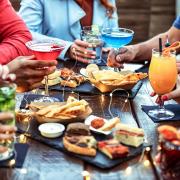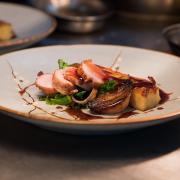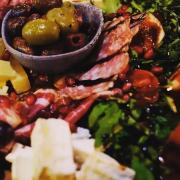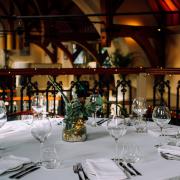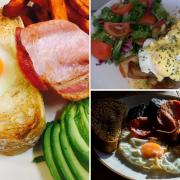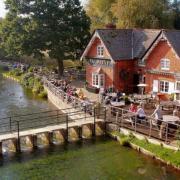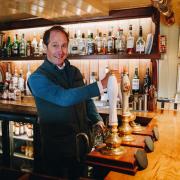A Hampshire chef has tapped into the growing food trend and opened a vegan cookery school

Seven years ago Peter Axworthy was "as far as you could get from being vegan", enjoying a carnivorous lifestyle and telling friends who suggested he go veggie not to be ridiculous. "Then I watched one of those documentaries on Netflix; I'd always been interested in the farming industry because I worked as a private chef but it switched my whole outlook," he says. "I wasn't a hippy type of person but the thought of taking another life from something that hadn't got the choice over it, and with the industry becoming so factory farmed, I just thought: 'I don't want to be part of that anymore'."
This abrupt decision resulted in a complete lifestyle change which has resulted in the two successful restaurants he runs today, along with what he believes is Hampshire's only vegan cookery school. "Within weeks of starting my vegan diet I'd started to notice the health benefits," he says. "I was working long hours at the time but I was less tired and could easily get out of bed."
He'd been concerned that not being able to use meat and dairy would lessen his passion for cooking but the opposite happened. "It seemed to reignite all the passion I had when I started cooking," he says. "I was learning so many things from new; new techniques, new flavours, I was being forced to try things I'd shied away from and I found it really exciting."
He'd always wanted to have his own restaurant and started searching for an appropriate venue. He found it six years ago at the Chesapeake Mill antiques centre in Wickham near Fareham where he opened one of the county's first fully vegan restaurants with his mum. "We called it OffBeet, partly as a play on words - we were a bit off the beaten track - but the Chesapeake Mill is a kind of off-beat place, it's partly made from ship's timbers," he says.

His philosophy was very simple. "I wanted a plant-based restaurant that non-vegans would want to come to. For many people vegan food is lentils and couscous but whenever I designed a dish I'd ask myself: 'Will a meat eater be satisfied with this? Is there enough on the plate, enough of a bold flavour, enough texture?'"
Understanding that, "a lot of people are nervous of new food because they don't want to pay for something where they worry that they may not like it," he concentrated on familiar dishes and concepts. "We started with things like bubble and squeak or burgers or coconut bacon," he says. "People would ask me why and I'd tell them that even the word 'bacon' helps build flavour and anticipation build in people's minds," he explains.
"We need to challenge the status quo of vegan foods. It's about welcoming people and letting them connect in a non-aggressive way and giving them a memorable experience to take away and tell other people about."
His second OffBeet restaurant, at Sunnyfields Farm near Marchwood in the New Forest, took his concept to a whole new level. "I'd known Sunnyfields for years; bought produce off the farm, and we had talked about building a premises there," he says. "The years went by and suddenly we decided we would just do it."

As he contemplated the layout, Peter decided it would have to include a cookery school because: "It seemed logical; there was the space and I thought how great it would be for students to use veg that had been pulled out of the ground that morning, or even stuff they had been able to pick themselves."
He started recruiting staff whose enthusiasm for the project even saw them helping to decorate the place. It opened last year and has been rammed ever since with an adoring clientele who can't get enough of their oat milk lattes, epic buckwheat waffles, LA Tacos and falafel burritos made with Sunnyfields' organic beetroot.
The cookery school has been equally popular with vegans and non-vegans alike. At the beginning of each course Peter asks participants to introduce themselves and ask what's brought them to the cookery school. "Non-vegans say they are coming here because they want to give it a go, or they've got friends or family who are vegan and want to cook them a great meal," he says.
"People want to learn some dishes they can cook easily on a night when they are tired and cold come in from work, practical stuff like that. They say they've come to the course because they are trying to eat vegan two days a week, or a month and they want to produce something nice. They want to know what they can eat and how they can cook it. The wall between vegans and non-vegans is breaking down."

Their most popular course is Everyday Vegan and the thing that almost every participant wants to know is how to make the plant-based cheeses used in so many recipes. "When you go vegan people say you miss bacon but for me it was melted cheese," remembers Peter. "We teach people to make vegan mozzarella and ricotta as well as sour cream and double cream."
He believes a lot of vegan cookery courses are: "Very samey, designed by people who aren't vegan and aren't passionate about it like we are. We want to make our courses innovative, especially for people who've never been on a cookery course before."
Long term they want to offer courses to professionals because: "With more places opening up vegan restaurants and having vegan options there's not a lot of professional training for plant-based chefs."
For 2020 they intend to launch a number of new courses and: "Try and get the word out there that we're a fully-plant based cookery school, based on a vegetable farm." They're also launching their own brand of vegan deli food. "There will be a cheese you can take home to use in recipes, an omelette mix you can add water to and make at home and we'll be selling the range at our restaurants and in health-food stores," he says.
For Peter it's all part of the bigger picture, not making people feel bad about what they eat but feel enthused about trying new things and then learning that they can make them, themselves.
"If you can convince people to have an oat latte once a week or to have a three-course vegan meal when they go out, because it tastes so wonderful, to me that's job done."






